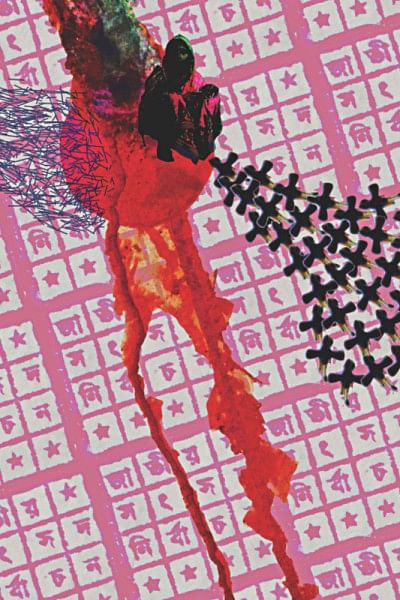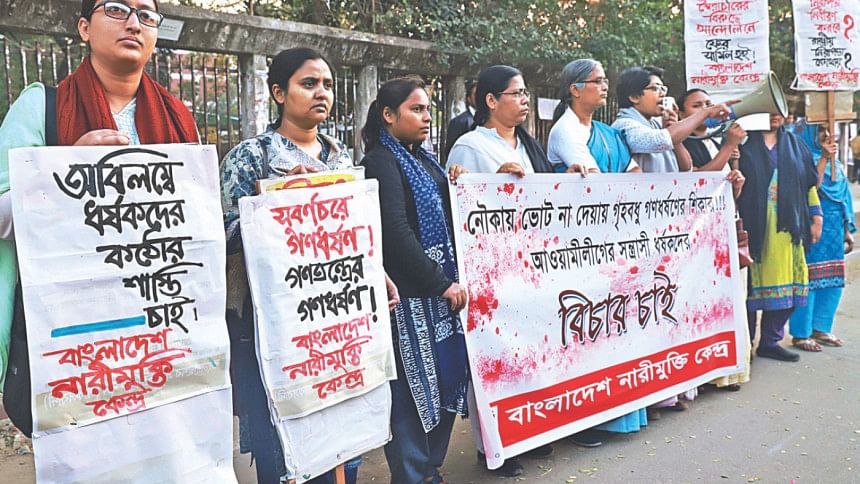Subarnachar rape: What NHRC said happened and what really happened

On the night of December 31, a day after the election, a mother of four was gang-raped in Subarnachar upazila of Noakhali. The rape is widely being acknowledged as election violence.
Except the National Human Rights Commission (NHRC) does not agree. Last week, it investigated the Subarnachar rape incident and concluded that it could not find any link between the incident and the elections.
"We found primary evidence that Parul Begum was raped and severely injured using blunt force, but we could not establish any link between the rape and the 11th national parliamentary elections," states the investigation report published by the NHRC on January 8.
NHRC spoke to the survivor—and as per the transcript of the interview included in its report, she clearly mentioned the name of at least one of her rapists—Sohel—as being present at the voting centre. Parul stated during her interview to the human rights body: "I told the men that I will vote for who I want, and they said, 'Leave now, you will be put in your place in the evening.' Then Sohel said, "See you tonight.'"
"We were in bed. Around 12:30am there was loud banging on the door and when we wanted to know who it was this late at night, they said they were from the police station. I opened the door and around ten people came in. I asked Sohel bhai why he was trying to break down the walls of my house this late at night," the survivor told the NHRC.
Afterwards, Parul's husband, children and pet dog were tied up, while she was gang-raped by Sohel and others in her courtyard.
"That the NHRC said this is very disappointing. The survivor too is a witness and her testimony should be taken into account," eminent human rights lawyer Salma Ali told this correspondent. Ali had personally met with the survivor to take her testimony.
"This rape was not caused by prior enmity—and even if there is prior enmity it does not matter. The incident happened the very night of election day and was perpetrated by people who were present at the polling centre."
The NHRC's conclusion also overlooked the fact that Ruhul Amin, the person booked as the perpetrator who ordered the rape, was, in fact, a polling agent inside the voting centre where Parul went to cast her vote. Amin is a former Union Parishad member.
Very interestingly, the reason why NHRC overlooked this very important link is based on a mere technicality: apparently neither Parul nor her husband mentioned to the NHRC that the alleged rapists belonged to the ruling party.
As they say in their report, "In her testimonial to the investigation committee, Parul Begum did not mention anything about the rapists being members or polling agents of the party in opposition to dhaner shish." The report further goes on to claim that her husband did not tell the NHRC either.
This logic also does not acknowledge that on January 6, 2019, Ruhul Amin was expelled from the Awami League for his involvement with the rape.
"Ruhul Amin was a polling agent at my voting centre," said Mohammed Faizullah, the presiding officer of Madhya Bagga Primary School, when called by this correspondent. "I saw him sitting in a room, asked him who he is, and he said he is a polling agent. So, I took his signature and registered him as one."
Star Weekend spoke to many of the assistant presiding officers of that voting centre, and they claimed that Ruhul Amin was in continuous interaction with voters. "He sat in all the rooms. He seemed to be supervising all the agents and giving them orders to do things," said three of the assistant presiding officers. "The school is open and has no gates and the voters were lined up in front of the polling booths so whoever wants can interact with them," another explained.
"It was a one-sided vote in my polling booth.

The nouka polling agents did not let the voters go behind the curtain to cast their vote—and whoever was voting for any party but the ruling party was being made to vote on 'boat' on another ballot," admitted another assistant presiding officer. He could not remember the identities of the polling agents inside his room, but his colleague Belal Hossain could remember the designations. "I had a polling agent who was a labour supervisor in a brick field," he told this correspondent over the phone.
Ruhul Amin was a labour contractor for brick fields, according to locals. The other rapists apprehended were all labourers working under him.
"Ruhul Amin made my son Murad believe the dreams of development and led him astray. My son is a labourer," said the father of the alleged rapist to this correspondent over the phone.
Another father also claimed the same. "My son is a labourer and used to hang out with Ruhul Amin for work," said Abdul Mannan, the father of Swapan, one of the alleged rapists arrested. When asked whether his son does politics with the ruling party, he agreed.
The frail old man, who seems to be in his 80's, recently stood up onstage at a protest meeting organised by Nijera Kori, an NGO, and denounced his son in front of a full crowd. "My son is a rapist. I want him tried and hanged. I don't care whether he is hanged or he goes to hell." Saying this, the man could not say anything more. He hung his head and walked off the stage.
To validate their conclusion, the NHRC report cites the First Information Report (FIR) of the criminal case filed by the rape survivor's husband. Truth be told, the FIR has no mention of any election-time altercation, stating that the rape happened because of past enmity between the survivor and the rapists. But the problem is that Mohammed Sirajul Islam, the survivor's husband claims that he did not write it—that it was written for him.
"I am an illiterate man, how can I write the FIR?" he has said over and over again to Star Weekend and other media. "I narrated to them what had happened and a police officer wrote it for me."
He claimed that this is what he narrated to them: Parul had gone to vote at the polling booth at Madhya Bagga Primary School when she was accosted by men who told her to vote for the "boat" insignia. Parul refused to yield and was threatened by the men "that they will put her in her place that evening." None of these details, however, was in the FIR.
"He did not tell us any of this. We only write in the FIR what the person filing the case dictates," said Mohammed Nizam Uddin, the officer-in-charge of Charjabbar police station to Star Weekend. On the other hand, his superior, Mohammed Ilias Sharif, the police superintendent of Noakhali believes that Sirajul himself wrote the case statement. When this correspondent pointed out that Sirajul is illiterate, he said, "If you believe that, then the conversation ends here."
In fact, NHRC's report itself acknowledges that Sirajul did not write the FIR himself. "The daroga came and took me to the police station. He wrote the case statement and I signed," reads the commission's report. Sirajul's signature too is somewhat telling of his lack of literacy—he shortened his name to "Siraj" and the letters are disjointed and drawn in a wobbly hand.
Yet that is the FIR upon which the rights body is basing its conclusion.
Meanwhile the OC and SP—the two men who insist that the rape was linked to a personal feud instead of the election—were two of the people the NHRC spoke to during their fact-finding mission. Other than them, the only officials they purportedly spoke to were the district commissioner and the head of the Noakhali General Hospital. According to the report they published, they did not interview any officer or witness who may have been present on election day at the polls.
There is a wide array of evidence pointing out that the rapists were linked to the ruling party, and at least two of them were present at the voting centre where Parul Begum cast her vote. Not just Parul, but witnesses around her are willingly offering proof. It is utterly baffling, that none of this evidence was taken to account by the NHRC when it concluded that the rape was not linked to the polls. The NHRC is condemning the rape—as they should—but their rejection of the possibility of this being polls-time violence refuses to recognise that Parul's democratic rights are not limited to physical safety, but also include the right to vote for whoever she wants.

 For all latest news, follow The Daily Star's Google News channel.
For all latest news, follow The Daily Star's Google News channel. 



Comments